
Contacts
Helene Ni Choncheanainn
Programme Assistant, East and Southern Africa Division
East and Southern Africa Division
IFAD
Via Paolo Di Dono, 44
00142 Rome, Italy
Fax: +39 06 5043463
Email: [email protected]
Past issues
About IFAD
The International Fund for Agricultural Development (IFAD) is a specialized agency of the United Nations, dedicated to eradicating poverty and hunger in developing countries. Its work in remote rural areas of the world helps countries achieve the Millennium Development Goals.
 Water for Agriculture
Water for Agriculture
Over 2000 years ago, the Ancient Romans were faced with a pressing dilemma: providing clean water to a growing city while irrigating agricultural land to ensure a constant food supply to urban consumers. They found a powerful answer to their problem by developing the technology of the aqueducts which meant that for centuries, they had the most advanced infrastructure in the world.
Rwanda: Innovative ways to access water
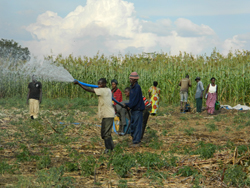
Beyond the traditional dams which irrigate long stretches of land, various innovations to support crop production, in and out of season, have been implemented by the Kirehe Community based Integrated Watershed management project (KWAMP) supported by IFAD in Rwanda. The project has reclaimed some marshlands and set up valley dams and schemes, to enable farmers to grow rice for home consumption and commercial purposes as well as upland crops development. Vegetables and fruits are also grown throughout the year to improve the diet of the families.
Swaziland: Working in a water-scarce environment with permaculture and water-harvesting
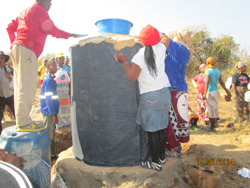
One of the issues faced by the communities under the Sustainable Land Management project run by the Lower Usuthu Smallholder Irrigation Project (LUSIP) and the Global Environment Facility-(GEF) in Swaziland is water scarcity. This means that people walk long distances to fetch water and, in some instances, share water sources with livestock. This not only poses great health risks but also means that women have to spend a lot of their valuable time walking to the water source instead of carrying out other activities. At times, they find the rivers dry and have to dig into the sand in order to get to the water level.
Ethiopia: Empowering youth through irrigation
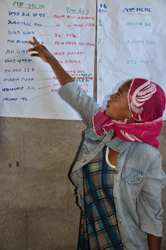
With the rising trend of urban migration in Ethiopia and the pressing need to feed a growing population, it is more important than ever to give young people opportunities to engage in farming. Youth under-employment is a serious challenge in both rural and urban areas with an increasing number of young people having limited opportunities and often being unemployed or owning few assets. To this end, the Participatory Small Scale Irrigation Development Programme (PASIDP), supported by IFAD, has targeted youth in particular, offering them the opportunity to pursue farming as a business to improve their livelihood and invest into new opportunities.
Malawi: Irrigation as a pillar for food security and improved nutrition
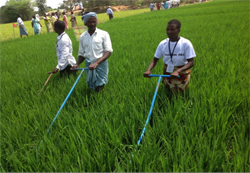
IFAD is supporting the government of Malawi on the rehabilitation, construction and promotion of irrigation schemes to address the challenges of low productivity and profitability of Malawi’s agriculture. Most smallholder farmers in Malawi remain food insecure due to an overly dependence on rain-fed agriculture. Only one crop is grown annually with consequent underemployment during the dry season. The low production and productivity lead to persistent food insecurity, lack of diversification in farming systems (70-80% is maize), poor dietary intake, poverty and consequent high prevalence of under nutrition.
Zambia: A showcase of sustainable irrigation systems
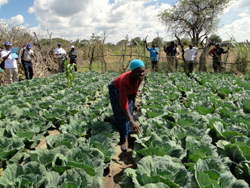
Implementing projects which will continue to function in a sustainable manner over the long-term can be a challenge for development organisations. Often, projects ran into unexpected problems which the local communities can find a struggle.In Zambia, the Nabuyani irrigation scheme put in place under the Smallholder Irrigation Water Users Programme (SIWUP), supported by IFAD, has become a showcase of success in terms of sustainability. "During the appraisal of the project, we looked at many aspects, including its sustainability," explained Dick Siame, former coordinator of the project. "So we tried to put in place an organisation that would function over the long term."
Madagascar: Drip irrigation, a technology adapted to the local environment
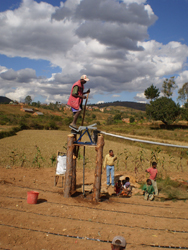
The project on Scaling-Up Micro-Irrigation Systems (SCAMPIS) in Madagascar started in 2009 with the support of a grant from IFAD's Policy and Technical Advisory Division (PTA). Its initial objective was to improve water availability and water management for 10,000 farmers through the implementation of micro-irrigation systems, and thus lead to better agricultural productivity in the target areas.
Tanzania: Water Works
Cecilia William used to depend on irregular rainfall to irrigate her crops. As a single mother, she struggled to grow enough to feed her family. Now an irrigation system has changed her life. With regular access to water, Cecilia is not only a successful farmer, but she is now an innovative entrepreneur.